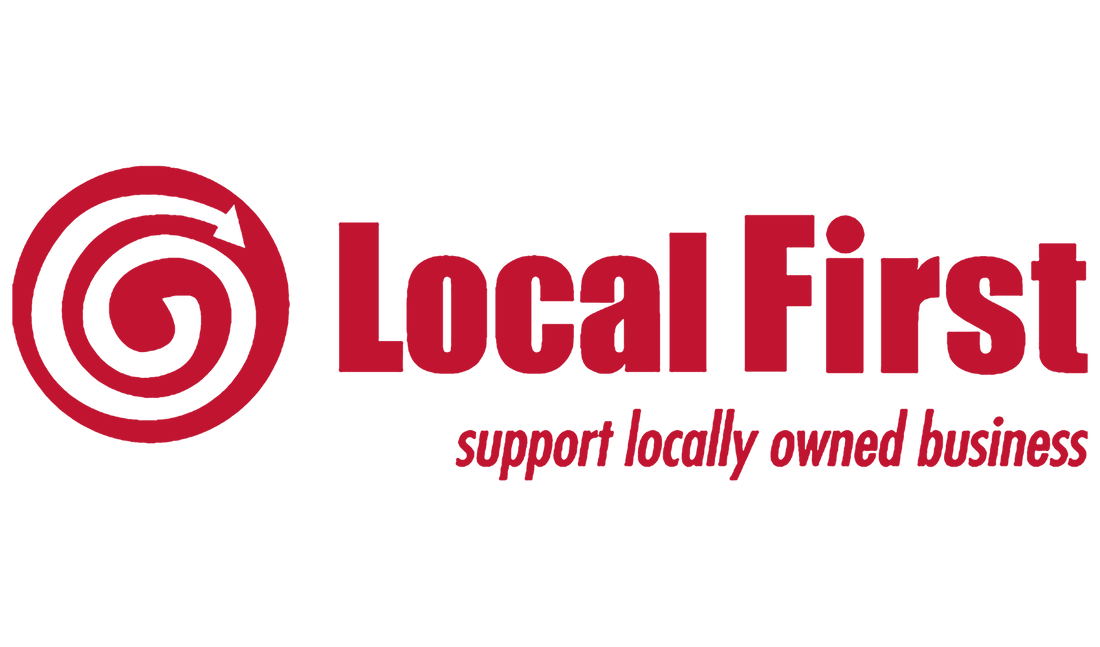Frequently Asked QuestionsWhere does the idea of a co-op come from? What is the strength of this model and why is this type of model often challenging to get off the ground?
Co-ops have been around since the mid-1800s. Research has shown co-ops actually outlive capitalist business models! Their strengths and challenges come from requiring community engagement over sitting on the sidelines and passively waiting for change. This is what solidarity can look like! |
|
How did the co-op get started?
The dream of the Grand Rapids Food Co-op began in 2015 when founders Linda Jones and Deborah Eid met and, since they already knew about food co-ops in other cities, decided our city could benefit from having a food co-op to ensure better food access where it is needed and to support our local farmers and food producers. They went a national start-up food co-op conference sponsored by FCI and quickly discovered the interconnected web of support from other like-minded people around the country who were starting new food co-ops, too. When they returned, they started a Facebook page to get the word out, and the “likes” poured in. They saw this as a positive sign that folks were interested in this project, and gathered a core group together. We began by studying a business/decision-making model called sociocracy. With a few meetings and the beginnings of a foundation under our belt, Inspired with new energy and a new network of connections, we decided to incorporate in late 2016 and began welcoming owners. In the fall of 2016 we had our first annual meeting, and owners from across the city were elected to take on leadership roles to make this dream a reality.
Okay, so how would a co-op benefit our city?
How did you settle on the share price of $250?
We intentionally set out to connect with and learn from other co-ops across the country about best practices. To name a couple of local examples, we learned from PFC (Kalamazoo) and Wild Onion (Chicago) that their shares were set at $250 because this was the best amount to generate a good seed fund for development. We also wanted to make sure everyone could join the co-op, so we decided to offer a Food For All share for low income owners and to have a scholarship fund available for those who are in need of that support to join. We also decided to have our share cover the whole household, not just an individual like many co-ops have. Currently our shares are at two levels:
I’ve always thought food co-ops were like Whole Foods, expensive food for high-end shoppers. Are you going to have affordable food and culturally based food options?
This is a great question, and one we discuss often. We believe our co-op can and will actually meet the wider needs of our community because it is owned by us: we decide what kind of store it will be, and what kind of food it will have. Other co-ops have been able to offer an across the board food discount to owners who are using EBT cards by rounding up at the register. We are hoping to be able to offer this as well. Also, when food is sourced locally, it can be more affordable since transportation costs are lower.
Who can shop at the co-op?
The co-op will be open to all shoppers whether they are owners or not, and anyone can join the co-op. Owners will have special discounts at the store.
How will the co-op insure diversity, equity, and inclusion?
Empowerment and solidarity are key values of coops. We are owned by diverse people and have made it easy for low income owners of all races to join us. We consistently have Black, LGBTQ, and low income leadership. And we work closely with these community organizations which are also working for progressive change:
Seems like you’ve been at this a long time. When do you think the store will open?
We are learning that the typical food co-op startup takes 7-10 years to open a store. We are in year 6 in 2022. So we are pretty much on track. Our timeline is dependent upon community buy-in, which is how it should be for a cooperative. Assuming we reach our goals, we plan to open the store in about 2 years.
You sold me. But what does my ownership in the co-op really mean? Will I have to help run the store?
Great questions. Importantly, your ownership isn't a donation. You will be buying your share in our co-op business which gives you equal voting power with every other co-op owner. The store will be professionally run, so no, you will not have to volunteer once it opens, although volunteer opportunities will be available.
As an owner, there are a few important things to note:
The shares of 1,000 ownerships (close to $250,000) isn’t enough to open a brick and mortar store, so how will we fund the buildout?
The owner shares we raise are our seed money to pay for studies, business plans, marketing, outreach, and consultants. To pay for the store buildout, we will draw from a diversity of funding including ownership loans, traditional commercial bank or credit union loans, grants, donations, and co-operative loan funds. As previously stated, we plan to use owner loans to show commercial lenders that we are backed by assets and community support.
Why does it matter for the co-op to have 1,000 owners when the build out begins?
The short answer would be that the number comes from calculations based on the size of our city and the projected size of our co-op, and the number of owners needed to raise the amount of funds needed to build out the store.
Here is a breakdown of our ownership goals and rationale based on a 7,000-10,000 sf store size:
How can I ensure my money will actually go towards funding the co-op and won’t be used for something else?
As a cooperative corporation, we have legal duties and bylaws which govern our board’s actions. All spending decisions are available to our owners on request in the form of monthly reports and annual meetings. We also operate under state law, but honestly we hope you can get a chance to know our board to see how truly invested they are in our community! Remember, the owners elect the board and can replace them if any problems arise.
No form of investment is completely risk-free. We encourage you to become informed when it comes to any type of financial commitment. If the co-op decides it isn’t feasible to open a store and we dissolve the co-op, the bylaws stipulate that the shares will be returned to the owners equitably from what funds remain.
The dream of the Grand Rapids Food Co-op began in 2015 when founders Linda Jones and Deborah Eid met and, since they already knew about food co-ops in other cities, decided our city could benefit from having a food co-op to ensure better food access where it is needed and to support our local farmers and food producers. They went a national start-up food co-op conference sponsored by FCI and quickly discovered the interconnected web of support from other like-minded people around the country who were starting new food co-ops, too. When they returned, they started a Facebook page to get the word out, and the “likes” poured in. They saw this as a positive sign that folks were interested in this project, and gathered a core group together. We began by studying a business/decision-making model called sociocracy. With a few meetings and the beginnings of a foundation under our belt, Inspired with new energy and a new network of connections, we decided to incorporate in late 2016 and began welcoming owners. In the fall of 2016 we had our first annual meeting, and owners from across the city were elected to take on leadership roles to make this dream a reality.
Okay, so how would a co-op benefit our city?
- Improve healthy and fresh food access where it is needed most at competitive prices;
- Sustainably support our local farmers and food producers and fair trade globally;
- Hire locally at competitive wages/benefits
- Provide a welcoming place for everyone to gather, shop and eat.
- Keep our local food dollars local and share the profits with our co-op owners;
- Show our region that our basic needs can be met equitably and effectively through the co-op model which empowers diverse leadership and community informed decisions.
How did you settle on the share price of $250?
We intentionally set out to connect with and learn from other co-ops across the country about best practices. To name a couple of local examples, we learned from PFC (Kalamazoo) and Wild Onion (Chicago) that their shares were set at $250 because this was the best amount to generate a good seed fund for development. We also wanted to make sure everyone could join the co-op, so we decided to offer a Food For All share for low income owners and to have a scholarship fund available for those who are in need of that support to join. We also decided to have our share cover the whole household, not just an individual like many co-ops have. Currently our shares are at two levels:
- Standard is $250 (paid in full or in 10 monthly installments)
- Our Food For All Share is $25 for low-income families ( paid in full or in 5 monthly installments)
I’ve always thought food co-ops were like Whole Foods, expensive food for high-end shoppers. Are you going to have affordable food and culturally based food options?
This is a great question, and one we discuss often. We believe our co-op can and will actually meet the wider needs of our community because it is owned by us: we decide what kind of store it will be, and what kind of food it will have. Other co-ops have been able to offer an across the board food discount to owners who are using EBT cards by rounding up at the register. We are hoping to be able to offer this as well. Also, when food is sourced locally, it can be more affordable since transportation costs are lower.
Who can shop at the co-op?
The co-op will be open to all shoppers whether they are owners or not, and anyone can join the co-op. Owners will have special discounts at the store.
How will the co-op insure diversity, equity, and inclusion?
Empowerment and solidarity are key values of coops. We are owned by diverse people and have made it easy for low income owners of all races to join us. We consistently have Black, LGBTQ, and low income leadership. And we work closely with these community organizations which are also working for progressive change:
- Together West Michigan a new organization which is bringing the whole community together to work for needed change that the community has identified.
- Seeds of Promise, a neighborhood association on the Southeast side
- Neighbors of Belknap Lookout on the Northeast side
- Creston Neighborhood Association on the Northeast side
- Essential Needs Task Force, Food and Nutrition subcommittee
- West Michigan Sustainable Business Forum
- Local First
- Food Co-op Initiative
- NCBA/CLUSA
Seems like you’ve been at this a long time. When do you think the store will open?
We are learning that the typical food co-op startup takes 7-10 years to open a store. We are in year 6 in 2022. So we are pretty much on track. Our timeline is dependent upon community buy-in, which is how it should be for a cooperative. Assuming we reach our goals, we plan to open the store in about 2 years.
You sold me. But what does my ownership in the co-op really mean? Will I have to help run the store?
Great questions. Importantly, your ownership isn't a donation. You will be buying your share in our co-op business which gives you equal voting power with every other co-op owner. The store will be professionally run, so no, you will not have to volunteer once it opens, although volunteer opportunities will be available.
As an owner, there are a few important things to note:
- A household investment qualifies ownership to everyone living under one roof;
- Your share is a one-time investment (can be made in 10 monthly installments, 5 for a Food for All share);
- With ownership, you can vote in our board elections, on major policy decisions, and on the future of the food co-op, and serve on the board and other volunteer activities;
- You will be able to shop at the food co-op and get benefits that include owner-only sale items and owner discount days;
- If you move away or decide you don't want to be an owner, your share will be refunded.
The shares of 1,000 ownerships (close to $250,000) isn’t enough to open a brick and mortar store, so how will we fund the buildout?
The owner shares we raise are our seed money to pay for studies, business plans, marketing, outreach, and consultants. To pay for the store buildout, we will draw from a diversity of funding including ownership loans, traditional commercial bank or credit union loans, grants, donations, and co-operative loan funds. As previously stated, we plan to use owner loans to show commercial lenders that we are backed by assets and community support.
Why does it matter for the co-op to have 1,000 owners when the build out begins?
The short answer would be that the number comes from calculations based on the size of our city and the projected size of our co-op, and the number of owners needed to raise the amount of funds needed to build out the store.
Here is a breakdown of our ownership goals and rationale based on a 7,000-10,000 sf store size:
- 800 owners needed to sign a lease with conditions and begin fundraising. Co-op owners will be offered the investment opportunity to loan the co-op money with a term and a rate of return. Talk about investing locally! These loans are often more flexible than commercial bank loans and will help show that our community is invested in our vision. They will be held in escrow until the funding goal is reached.
- 1000 owners needed once the funds are raised, lease conditions are removed, and the build out begins. During this phase we hire a project manager and our general manager.
- 1500 owner-households projected by opening day. Before opening day the GM hires staff as locally as possible, trains the staff and stocks the store with input from the owners on the food choices.
How can I ensure my money will actually go towards funding the co-op and won’t be used for something else?
As a cooperative corporation, we have legal duties and bylaws which govern our board’s actions. All spending decisions are available to our owners on request in the form of monthly reports and annual meetings. We also operate under state law, but honestly we hope you can get a chance to know our board to see how truly invested they are in our community! Remember, the owners elect the board and can replace them if any problems arise.
No form of investment is completely risk-free. We encourage you to become informed when it comes to any type of financial commitment. If the co-op decides it isn’t feasible to open a store and we dissolve the co-op, the bylaws stipulate that the shares will be returned to the owners equitably from what funds remain.



